Jim Poling Sr.'s Blog, page 51
April 11, 2013
The World around a Campfire
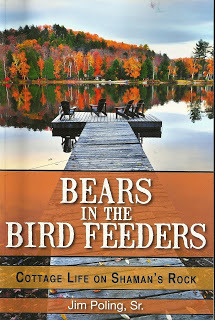 This is official publication week for Bears in the Birdfeeders, my new book of recollections and reflections of the huge joys and little agonies of cottaging.
This is official publication week for Bears in the Birdfeeders, my new book of recollections and reflections of the huge joys and little agonies of cottaging.I signed copies of the new work for interested folks attending the Cottage Life Show last weekend. It was enlightening to hear what time at the cottage means to them, their friends and their families. Everyone I spoke with agreed that cottages, whether owned, rented, or visited, are places where we just might find the keys to making the world a better place.
It’s hard to imagine North Korea’s Kim Jong-un spending an evening around a cottage campfire with other world leaders and still wanting to unleash his nuclear missiles.
Also it’s hard to imagine sitting by a forested lake for a few days, then returning to the city to vote in favour of filling in part of Lake Ontario to accommodate more air traffic along Toronto’s downtown waterfront. Cottage country is a vital component of the Canadian psyche. Bears in the Birdfeeders is an attempt to share an understanding of that psyche. Cottage Life Magazine and its related enterprises has been sharing that understanding with the rest of us for many years. Thanks to them for that, and for being so accommodating to me during the show.
For more details on the new book, click the Bears in the Birdfeeders tab at the top of this blog.
Published on April 11, 2013 09:41
April 1, 2013
The Tragedy of Stereotyping
I get challenged occasionally for the view, expressed in my book Smoke Signals: The Native Takeback of North America’s Tobacco Industry, that society continues to stereotype Native people. My defence is that although outright racism is not much seen anymore among intelligent people, stereotyping is still around, subtle but rampant.
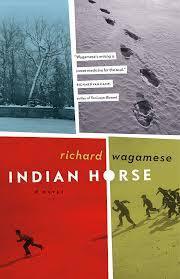 How stereotyping hurts is powerfully put forth in the novel Indian Horse by Richard Wagamese. It’s fiction, but remember the words of journalist-author Albert Camus: “Fiction is the lie through which we tell the truth.” Indian Horsepaints the tragedy of an Ojibway boy whose love for the game of hockey is destroyed by stereotyping. The type of stereotyping we’ve all witnessed in hockey arenas and elsewhere. It is a beautifully crafted and brilliantly written novel by Wagamese, an Ojibway from Northwestern Ontario who became a noted columnist for the Calgary Herald. Indian Horse is fiction that reveals truth and flows with important life messages. However, you don’t have to read Wagamese’s books to view the power of his writing and its messages. The opening lines of his web page http://www.richardwagamese.com/are these: “All that we are is story. From the moment we are born to the time we continue on our spirit journey, we are involved in the creation of the story of our time here. It is what we arrive with. It is all we leave behind. We are not the things we accumulate. We are not the things we deem important. We are story.” I wish I could have written that.
How stereotyping hurts is powerfully put forth in the novel Indian Horse by Richard Wagamese. It’s fiction, but remember the words of journalist-author Albert Camus: “Fiction is the lie through which we tell the truth.” Indian Horsepaints the tragedy of an Ojibway boy whose love for the game of hockey is destroyed by stereotyping. The type of stereotyping we’ve all witnessed in hockey arenas and elsewhere. It is a beautifully crafted and brilliantly written novel by Wagamese, an Ojibway from Northwestern Ontario who became a noted columnist for the Calgary Herald. Indian Horse is fiction that reveals truth and flows with important life messages. However, you don’t have to read Wagamese’s books to view the power of his writing and its messages. The opening lines of his web page http://www.richardwagamese.com/are these: “All that we are is story. From the moment we are born to the time we continue on our spirit journey, we are involved in the creation of the story of our time here. It is what we arrive with. It is all we leave behind. We are not the things we accumulate. We are not the things we deem important. We are story.” I wish I could have written that.
Published on April 01, 2013 04:33
March 21, 2013
Pope Francis and Canadian History
The recent election of the new Pope got me pondering Canadian history and the lack of attention it receives in our education systems. How does anyone get to that bizarre connection? Pope Francis is a Jesuit priest, the first from the Society of Jesus to reach that exalted position. The Jesuits helped shape the early development of North America, Canada and the northern U.S. in particular. They came to Christianize the Indians soon after Canada was discovered. Jesuits are not ordinary parish priests. They are highly-educated, famous for their education methods and travel a higher intellectual road than most of us.
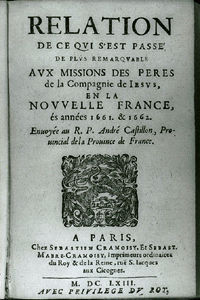 The most important thing the Jesuits did for Canada was to leave written observations of the New World and its people. The Jesuits in New France sent written annual reports to their superiors in Paris. The reports were called Relation de ce qui s’est passé en la Nouvelle France and were mainly narratives describing in detail the country, its people and how it was developing. The Jesuit Relations are a rich source of information on events that shaped Canada into the nation we know today. Anyone spending time reading the Relationswill gain a better understanding of what Canada is and why it developed so differently from the United States. The Relationsshould be part of the curricula of every Canadian education system. American historical writer-editor Reuben Gold Thwaites compiled the Relations into 73 volumes early in the 1900s. These English translations can be found at http://puffin.creighton.edu/jesuit/relations/. Also, Canadian scholar Allan Greer has compiled a small selection of the Jesuit Relations that gives readers a peek into this vast storeroom of Canadian history. It is titled The Jesuit Relations: Natives and Missionaries in Seventeenth-Century North America (Bedford/St. Martin’s 2000). Canadians generally are not very knowledgeable about their country’s history and often know more U.S. history than their own. And, that’s a shame considering the vast history resources available to us.
The most important thing the Jesuits did for Canada was to leave written observations of the New World and its people. The Jesuits in New France sent written annual reports to their superiors in Paris. The reports were called Relation de ce qui s’est passé en la Nouvelle France and were mainly narratives describing in detail the country, its people and how it was developing. The Jesuit Relations are a rich source of information on events that shaped Canada into the nation we know today. Anyone spending time reading the Relationswill gain a better understanding of what Canada is and why it developed so differently from the United States. The Relationsshould be part of the curricula of every Canadian education system. American historical writer-editor Reuben Gold Thwaites compiled the Relations into 73 volumes early in the 1900s. These English translations can be found at http://puffin.creighton.edu/jesuit/relations/. Also, Canadian scholar Allan Greer has compiled a small selection of the Jesuit Relations that gives readers a peek into this vast storeroom of Canadian history. It is titled The Jesuit Relations: Natives and Missionaries in Seventeenth-Century North America (Bedford/St. Martin’s 2000). Canadians generally are not very knowledgeable about their country’s history and often know more U.S. history than their own. And, that’s a shame considering the vast history resources available to us.
Published on March 21, 2013 06:04
March 8, 2013
Canada's National Disgrace Grows Even Bigger
The justice system's treatment of Native Canadians continues to worsen despite all our holier-than-thou statements about how we lead the world in human rights.
The federal incarceration rate of Native people has jumped 56.2 per cent in the last decade, the Office of the Correctional Investigator reported to Parliament this week.Since 2000-2001 the Native representation in federal prisons has jumped from 17 per cent to 23.2 per cent.
Simply put, almost one-quarter of persons in Canadian federal prisons are Natives despite the fact that Natives make up only four per cent of the Canadian population.
 The report also noted that 41 per cent of all women sentenced to custody in federal prisons and provincial jails are native.
The report also noted that 41 per cent of all women sentenced to custody in federal prisons and provincial jails are native.
A backgrounder to the report says what we all know, or should know:
"The high rate of incarceration for Aboriginal peoples has been linked to systemic discrimination and attitudes based on racial or cultural prejudice, as well as economic and social disadvantage, substance abuse and intergenerational loss, violence and trauma."
Natives have lower parole grant rates, are over-represented in segregation and maximum security, and are more likely to return to prison for parole violations based on administrative, not criminal violations.
This is a national disgrace created by stereotyping and outright racism. No one should ever call Canada the greatest country in the world while these shocking statistics, and the reasons behind them, continue to exist.
More on prison ombudsman's report can be found at: http://www.oci-bec.gc.ca/index-eng.aspx
Also, more detail on how the justice system treats Native people can be found in my new book Smoke Signals: The Native Takeback of North America's Tobacco Industry available at online booksellers such as Amazon and Chapters-Indigo, or anywhere where books are sold.
The federal incarceration rate of Native people has jumped 56.2 per cent in the last decade, the Office of the Correctional Investigator reported to Parliament this week.Since 2000-2001 the Native representation in federal prisons has jumped from 17 per cent to 23.2 per cent.
Simply put, almost one-quarter of persons in Canadian federal prisons are Natives despite the fact that Natives make up only four per cent of the Canadian population.
 The report also noted that 41 per cent of all women sentenced to custody in federal prisons and provincial jails are native.
The report also noted that 41 per cent of all women sentenced to custody in federal prisons and provincial jails are native.A backgrounder to the report says what we all know, or should know:
"The high rate of incarceration for Aboriginal peoples has been linked to systemic discrimination and attitudes based on racial or cultural prejudice, as well as economic and social disadvantage, substance abuse and intergenerational loss, violence and trauma."
Natives have lower parole grant rates, are over-represented in segregation and maximum security, and are more likely to return to prison for parole violations based on administrative, not criminal violations.
This is a national disgrace created by stereotyping and outright racism. No one should ever call Canada the greatest country in the world while these shocking statistics, and the reasons behind them, continue to exist.
More on prison ombudsman's report can be found at: http://www.oci-bec.gc.ca/index-eng.aspx
Also, more detail on how the justice system treats Native people can be found in my new book Smoke Signals: The Native Takeback of North America's Tobacco Industry available at online booksellers such as Amazon and Chapters-Indigo, or anywhere where books are sold.
Published on March 08, 2013 05:38
February 22, 2013
In Jay's Corner
Ten years ago a determined young couple bought the Firehouse Restaurant beside Ox Narrows on Haliburton County’s Kushog Lake. They worked doggedly to develop it as a casual eating and gathering place for the cottagers, full-time residents and visiting outdoor enthusiasts who enjoy the wild beauty of this lake country.
 The Fire House on Kushog Lake The couple, Jay Manning and Anita Maracle-Manning, expanded their restaurant vision into a base camp for exploring the extensive wilderness trails developed for ATVs, snowmobiles, canoeists and campers. They also offered more outdoor enjoyment through fishing derbies and golf tournaments. In short, they did everything to develop a solid business that would provide enjoyment for others. Last fall their vision suffered a devastating blow. Jay was told he had a brain tumour. He went through surgery and radiation treatment and now is into a second round of chemotherapy. Through all the medical treatments they have been trying to keep the business running. Now, Jay and Anita are not only fighting his cancer, they are struggling to pay for the drugs that his doctors say are needed to help him win the fight. The Ontario hospital insurance system will not pay for these drugs, which friends say are costing tens of thousands of dollars. One of these friends, Ellen Wiley, has started a campaign to help Jay and Anita. Ellen said in a recent email: “They have provided us all with sincere friendship for years. It is now time for all of us to step up to the plate to help them.” People can help by spreading the word through social networks, offering support, and if they wish, through financial donations to the In Jay’s Corner campaign. Anyone who wants to help or to receive more information should contact Ellen. Her co-ordinates:
The Fire House on Kushog Lake The couple, Jay Manning and Anita Maracle-Manning, expanded their restaurant vision into a base camp for exploring the extensive wilderness trails developed for ATVs, snowmobiles, canoeists and campers. They also offered more outdoor enjoyment through fishing derbies and golf tournaments. In short, they did everything to develop a solid business that would provide enjoyment for others. Last fall their vision suffered a devastating blow. Jay was told he had a brain tumour. He went through surgery and radiation treatment and now is into a second round of chemotherapy. Through all the medical treatments they have been trying to keep the business running. Now, Jay and Anita are not only fighting his cancer, they are struggling to pay for the drugs that his doctors say are needed to help him win the fight. The Ontario hospital insurance system will not pay for these drugs, which friends say are costing tens of thousands of dollars. One of these friends, Ellen Wiley, has started a campaign to help Jay and Anita. Ellen said in a recent email: “They have provided us all with sincere friendship for years. It is now time for all of us to step up to the plate to help them.” People can help by spreading the word through social networks, offering support, and if they wish, through financial donations to the In Jay’s Corner campaign. Anyone who wants to help or to receive more information should contact Ellen. Her co-ordinates:Ellen Wileyemail: ewiley@coldwellbanker.ca
Coldwell Banker Wiley Real Estate, Brokerage Dorset1-800-563-7593
[705]766-2182
Fax: [705]766-1230
Ellen also has established a PayPal account at: https://www.paypal.com/cgi-bin/webscr?cmd=_s-xclick&hosted_button_id=4U52NGYVE35EN
Published on February 22, 2013 07:59
February 11, 2013
Never Forgetting February
November is the traditional month of remembrance, but for some of us February is just as important.
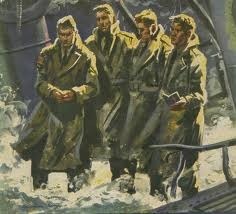 In February 1943, 70 years ago, the American troop ship Dorchester was torpedoed in the North Atlantic. Roughly 700 of the more than 900 aboard perished, including four chaplains, one Jewish, one Catholic and two Protestant. There was panic on the decks of the Dorchester as soldiers desperately scrambled for life preservers. The four chaplains tried to calm the soldiers and in the end gave their own life jackets to men without them. The action of the four chaplains has been called one of greatest acts of heroism of World War Two. One of the Protestant chaplains was Captain Clark Poling of the Dutch Reformed Church. He was the seventh generation of Poling ministers and his father was the Rev. Daniel Poling, editor of the Christian Herald. Decades ago the U.S. issued a stamp commemorating the heroism of the chaplains. A chapel in Philadelphia was dedicated to them. Time, however, slowly buries remembrances. The story of the Four Chaplains is unknown now to most people. This week the Los Angeles Times helped to keep the story of the Four Chaplains alive. It’s recollection of the Dorchester sinking can be found at: http://www.latimes.com/news/local/la-me-four-chaplains-20130211,0,3355001.story
In February 1943, 70 years ago, the American troop ship Dorchester was torpedoed in the North Atlantic. Roughly 700 of the more than 900 aboard perished, including four chaplains, one Jewish, one Catholic and two Protestant. There was panic on the decks of the Dorchester as soldiers desperately scrambled for life preservers. The four chaplains tried to calm the soldiers and in the end gave their own life jackets to men without them. The action of the four chaplains has been called one of greatest acts of heroism of World War Two. One of the Protestant chaplains was Captain Clark Poling of the Dutch Reformed Church. He was the seventh generation of Poling ministers and his father was the Rev. Daniel Poling, editor of the Christian Herald. Decades ago the U.S. issued a stamp commemorating the heroism of the chaplains. A chapel in Philadelphia was dedicated to them. Time, however, slowly buries remembrances. The story of the Four Chaplains is unknown now to most people. This week the Los Angeles Times helped to keep the story of the Four Chaplains alive. It’s recollection of the Dorchester sinking can be found at: http://www.latimes.com/news/local/la-me-four-chaplains-20130211,0,3355001.story
Published on February 11, 2013 07:35
January 18, 2013
Addicted Governments
More new evidence supporting the opinion that governments are addicted to tobacco revenue but less than committed to helping people, especially Natives and the poor, escape the smoking habit.
 The American Lung Association is reporting that U.S. state governments are taking in $25.7 billion in tobacco revenue annually but spending less than $0.5 billion on smoking prevention and control, which is a fraction of the $3.7 billion recommended by the Centres for Disease Control and Prevention. The same situation exists in most governments around the world. In Canada, federal spending on tobacco control has dropped by 40 per cent in the last six years, tobacco info.ca (www.tobaccoinfo.ca/mag10/federal.htm) reports. Canadian governments take in $7.5 billion a year from tobacco revenue and tobacco taxation continues to increase and help fuel the contraband market. A cynic would say governments really can’t be dedicated to reducing tobacco use when they are so dependent on it. They certainly are not showing much commitment to reducing smoking among Natives. In Canada, roughly 50 percent of natives living on reserves still smoke compared to 19 percent of other Canadians. Thirty-two percent of American Indians smoke compared to 19 per cent of non-Indians. Smoking is most prevalent among the poor and those with poor access to good education. No wonder there is an Idle No More Movement.More on this in Smoke Signals: The Native Takeback of North America’s Tobacco Industry (Dundurn Press).
The American Lung Association is reporting that U.S. state governments are taking in $25.7 billion in tobacco revenue annually but spending less than $0.5 billion on smoking prevention and control, which is a fraction of the $3.7 billion recommended by the Centres for Disease Control and Prevention. The same situation exists in most governments around the world. In Canada, federal spending on tobacco control has dropped by 40 per cent in the last six years, tobacco info.ca (www.tobaccoinfo.ca/mag10/federal.htm) reports. Canadian governments take in $7.5 billion a year from tobacco revenue and tobacco taxation continues to increase and help fuel the contraband market. A cynic would say governments really can’t be dedicated to reducing tobacco use when they are so dependent on it. They certainly are not showing much commitment to reducing smoking among Natives. In Canada, roughly 50 percent of natives living on reserves still smoke compared to 19 percent of other Canadians. Thirty-two percent of American Indians smoke compared to 19 per cent of non-Indians. Smoking is most prevalent among the poor and those with poor access to good education. No wonder there is an Idle No More Movement.More on this in Smoke Signals: The Native Takeback of North America’s Tobacco Industry (Dundurn Press).
Published on January 18, 2013 08:01
December 31, 2012
Resolved: That Families Eat Together
So, it’s resolution time once more. Following a long-standing tradition, I won’t be making any. Why torture yourself? Resolutions are really wishes that are difficult to fulfil. Just plain wishes are much better. If they don’t come about, there’s no huge disappointment, but if they do it’s a wonderful bonus.
 There are so many things to wish for - wishes that would improve the world. So many, it’s best to pick just one. One that would make our world a better place concerns eating. But not just reducing how much and what we eat to lose weight. My wish would be that families, no matter how you define them, sit down to eat one meal together every day. No television, no smartfones, no iPads. Just people eating and conversing. Sharing thoughts. Sharing observations and ideas. Understanding each other and bonding relationships. A study in Britain recently found that fewer than one-third of British families sit down to eat together every night. Fewer than 10 per cent do not eat together once a week even though 42 per cent adults try to encourage family meals together.(you can read more about the study at: http://www.dailymail.co.uk/femail/article-2235161/ ) Other studies in different parts of the world show that eating together makes for better grades in school, healthier eating habits, builds relationships and strengthens the ability to face problems and resist peer pressure. There is plenty of reading available on this topic, including The Surprising Power of Family Meals by author Miriam Weinstein. Happy New Year and best of luck with those resolutions!
There are so many things to wish for - wishes that would improve the world. So many, it’s best to pick just one. One that would make our world a better place concerns eating. But not just reducing how much and what we eat to lose weight. My wish would be that families, no matter how you define them, sit down to eat one meal together every day. No television, no smartfones, no iPads. Just people eating and conversing. Sharing thoughts. Sharing observations and ideas. Understanding each other and bonding relationships. A study in Britain recently found that fewer than one-third of British families sit down to eat together every night. Fewer than 10 per cent do not eat together once a week even though 42 per cent adults try to encourage family meals together.(you can read more about the study at: http://www.dailymail.co.uk/femail/article-2235161/ ) Other studies in different parts of the world show that eating together makes for better grades in school, healthier eating habits, builds relationships and strengthens the ability to face problems and resist peer pressure. There is plenty of reading available on this topic, including The Surprising Power of Family Meals by author Miriam Weinstein. Happy New Year and best of luck with those resolutions!
Published on December 31, 2012 09:09
December 24, 2012
A Voice of Strength and Hope
 Fresh fallen snow protested beneath the crush of my gumboots breaking trail down the unploughed lane. Dry, sharp squeaks, not unlike the cries of cheap chalk cruelly scrapped against too clean a blackboard. Skuur-eek, skuur-eek. The boots ignored the sounds. They moved on, ribbed rubber bottoms and laced high leather tops creating a meandering wake in the ankle deep snow. To each side of the trail, drifted snow leaned tiredly against the backsides of the bungalows, dropped there to rest by an impatient Christmas Eve blizzard just passed through. Faint strains of music joined the squeaking as I approached our back fence. I stopped to hear the music more clearly, now identifiable as singing voices escaping through an open window. I shuffled forward and listened to the notes float out crisply and clearly, then mingle with smoke rising from the chimneys. Notes and smoke rose together into an icy midnight sky illuminated by frost crystals set shimmering by thousands of stars, and the frosty moon the Chippewas called Manidoo Geezis, the little spirit moon of early winter. I held my breath to hear better and determined that the music was the Christmas carol O Holy Night, and that the notes came from the window in my grandmother's room. It was open to the cold because most people smoked cigarettes back then, and at gatherings cracked a window to clear the air. They sang the first verse, and when they reached the sixth line, the other voices ceased and one voice carried on alone: "Fall on your knees! Oh, hear the angel voices! O Niiii . . .iiight Diii…vine! . . . ." That's the part where the notes rise higher and higher until the singer reaches an awesome note. The solo voice belonged to my grandmother, Louise LaFrance, and I knew she hit that high note while sitting on the edge of the bed that was her prison. She was crippled with limb-twisting rheumatoid arthritis and suffered searing pain and the humiliation of being bedridden, a humiliation that included needing a bedpan to relieve herself and having her son-in-law lift her into the bathtub. The others stopped singing to listen to her. Each time she hit the high notes at the words 'O Night Divine', a shiver danced on my spine. When she finished singing O Holy Night, the other voices started up again, this time with Silent Night and other favourite carols. I went into the house and found Christmas Eve celebrants - my mom, dad and some neighbours - crowded into the 10-foot by 10-foot bedroom that was my grandmother's world. They sang long into the night, mostly in French because the neighbours were the Gauthiers who seldom spoke English to my grandmother and mother. The crippling arthritis had attacked my grandmother not long after my birth sixteen years before. It advanced quickly, twisting her fingers like pretzels, then deforming her ankles and knees. You could see the pain in her eyes and from my bedroom I could hear her moaning in restless sleep, sometimes calling out for relief. She took up smoking to ease the pain. Late into the night I would hear her stir, then listen for the scrape of a wooden match against the side of a box of Redbird matches. Then the acrid odour of sulphur drifted into my room, followed by the sweetness of smoke from a Sweet Caporal. Sometimes I would get up and go to her door and see the red tip of the cigarette glow brightly as she inhaled and I would go in and we would talk in the smoky darkness. Mostly the talk was about growing up and sorting through the conflicts between a teenager and his parents. After the singing ended that night, my mother served tortiere, which I slathered with mustard. Then we gathered at the tree and opened our gifts. I have long forgotten what I got that Christmas, and it doesn't matter. My real gift came many years later, and was an understanding of how that frail and twisted body came to produce such powerful and sweet notes. My gift was the realization that those high notes were not solely the products of the lungs. They were driven by something stronger than flesh - an unbreakable spirit. They came from strength far beyond anything that a mere body can produce. They came from the will to overcome. Adapted from Waking Nanabijou: Uncovering a Secret Past, By Jim Poling Sr., Dundurn Press 2007
Fresh fallen snow protested beneath the crush of my gumboots breaking trail down the unploughed lane. Dry, sharp squeaks, not unlike the cries of cheap chalk cruelly scrapped against too clean a blackboard. Skuur-eek, skuur-eek. The boots ignored the sounds. They moved on, ribbed rubber bottoms and laced high leather tops creating a meandering wake in the ankle deep snow. To each side of the trail, drifted snow leaned tiredly against the backsides of the bungalows, dropped there to rest by an impatient Christmas Eve blizzard just passed through. Faint strains of music joined the squeaking as I approached our back fence. I stopped to hear the music more clearly, now identifiable as singing voices escaping through an open window. I shuffled forward and listened to the notes float out crisply and clearly, then mingle with smoke rising from the chimneys. Notes and smoke rose together into an icy midnight sky illuminated by frost crystals set shimmering by thousands of stars, and the frosty moon the Chippewas called Manidoo Geezis, the little spirit moon of early winter. I held my breath to hear better and determined that the music was the Christmas carol O Holy Night, and that the notes came from the window in my grandmother's room. It was open to the cold because most people smoked cigarettes back then, and at gatherings cracked a window to clear the air. They sang the first verse, and when they reached the sixth line, the other voices ceased and one voice carried on alone: "Fall on your knees! Oh, hear the angel voices! O Niiii . . .iiight Diii…vine! . . . ." That's the part where the notes rise higher and higher until the singer reaches an awesome note. The solo voice belonged to my grandmother, Louise LaFrance, and I knew she hit that high note while sitting on the edge of the bed that was her prison. She was crippled with limb-twisting rheumatoid arthritis and suffered searing pain and the humiliation of being bedridden, a humiliation that included needing a bedpan to relieve herself and having her son-in-law lift her into the bathtub. The others stopped singing to listen to her. Each time she hit the high notes at the words 'O Night Divine', a shiver danced on my spine. When she finished singing O Holy Night, the other voices started up again, this time with Silent Night and other favourite carols. I went into the house and found Christmas Eve celebrants - my mom, dad and some neighbours - crowded into the 10-foot by 10-foot bedroom that was my grandmother's world. They sang long into the night, mostly in French because the neighbours were the Gauthiers who seldom spoke English to my grandmother and mother. The crippling arthritis had attacked my grandmother not long after my birth sixteen years before. It advanced quickly, twisting her fingers like pretzels, then deforming her ankles and knees. You could see the pain in her eyes and from my bedroom I could hear her moaning in restless sleep, sometimes calling out for relief. She took up smoking to ease the pain. Late into the night I would hear her stir, then listen for the scrape of a wooden match against the side of a box of Redbird matches. Then the acrid odour of sulphur drifted into my room, followed by the sweetness of smoke from a Sweet Caporal. Sometimes I would get up and go to her door and see the red tip of the cigarette glow brightly as she inhaled and I would go in and we would talk in the smoky darkness. Mostly the talk was about growing up and sorting through the conflicts between a teenager and his parents. After the singing ended that night, my mother served tortiere, which I slathered with mustard. Then we gathered at the tree and opened our gifts. I have long forgotten what I got that Christmas, and it doesn't matter. My real gift came many years later, and was an understanding of how that frail and twisted body came to produce such powerful and sweet notes. My gift was the realization that those high notes were not solely the products of the lungs. They were driven by something stronger than flesh - an unbreakable spirit. They came from strength far beyond anything that a mere body can produce. They came from the will to overcome. Adapted from Waking Nanabijou: Uncovering a Secret Past, By Jim Poling Sr., Dundurn Press 2007
Published on December 24, 2012 06:08
December 15, 2012
We Pretentious Canadians
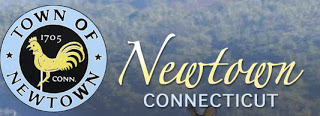 Canadians. We are such pretentious pains in the ass. We immediately started the finger wagging and scolding as our American friends and neighbours tried to hold themselves together against the shock waves of the mass murder of 26 school children and teachers Friday. CBC National TV news, being far more intelligent than Americans and its own declining Canadian viewership, intoned how America just can’t seem to control the problem of guns like Canada has. Its reporters shook their heads sadly, pontificating that Americans probably never will get it right. The Toronto Globe and Mail rushed in with an editorial saying it is time for the U.S. “to cure its sick gun laws.” It seemed annoyed that yet again it was “forced” to write about mass shootings in America. It called the U.S. a murderous society led by a president who has stuck his head in the sand. In times of tragedy, real friends put their arms around those who are hurting and keep their yaps shut. They comfort and they give help, if and when they are asked. Americans will debate and eventually solve their problems with guns, and without scolding from holier-than-thou neighbours to the north. But first they need to deal with their grief.
Canadians. We are such pretentious pains in the ass. We immediately started the finger wagging and scolding as our American friends and neighbours tried to hold themselves together against the shock waves of the mass murder of 26 school children and teachers Friday. CBC National TV news, being far more intelligent than Americans and its own declining Canadian viewership, intoned how America just can’t seem to control the problem of guns like Canada has. Its reporters shook their heads sadly, pontificating that Americans probably never will get it right. The Toronto Globe and Mail rushed in with an editorial saying it is time for the U.S. “to cure its sick gun laws.” It seemed annoyed that yet again it was “forced” to write about mass shootings in America. It called the U.S. a murderous society led by a president who has stuck his head in the sand. In times of tragedy, real friends put their arms around those who are hurting and keep their yaps shut. They comfort and they give help, if and when they are asked. Americans will debate and eventually solve their problems with guns, and without scolding from holier-than-thou neighbours to the north. But first they need to deal with their grief.
Published on December 15, 2012 08:15



